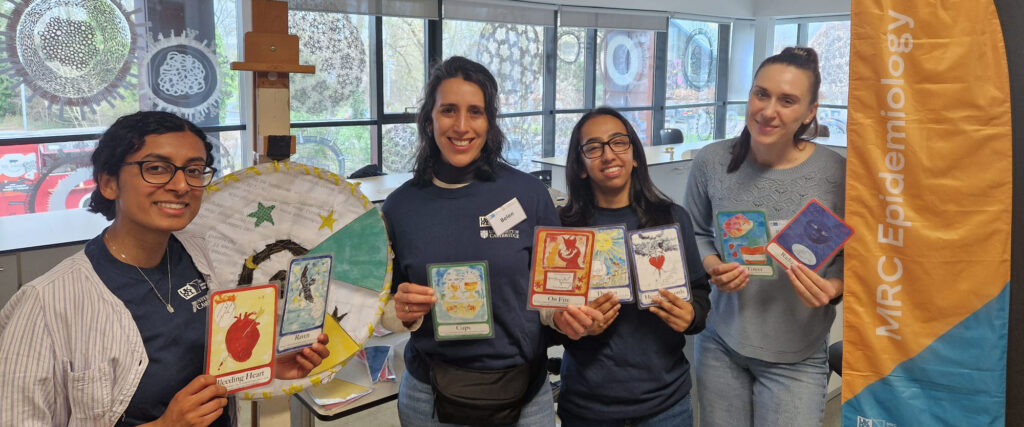The latest news from the MRC Epidemiology Unit
Welcome to 2025 issue 2 of epigram, the quarterly newsletter from the MRC Epidemiology Unit at the University of Cambridge.
To receive this email straight to your inbox, sign up at www.mrc-epid.cam.ac.uk/subscribe/
Explore with us at the Cambridge Festival
What is a healthy weight
As the Cambridge Festival draws to a close, there is still time to sign up for What does research tell us about maintaining a healthy weight?
Unit researchers Dr Amy Ahern and Professor Nick Wareham join this live webinar showcasing what the NIHR Cambridge Biomedical Research Centre is doing to understand and treat obesity.
Thursday 3 April, 18:00 – 19:00
Register here.
Cambridge Festival at CAST
A team of volunteers from the MRC Epidemiology Unit joined the Cambridge Festival family drop-in event at Cambridge Academy for Science and Technology on Saturday 22 March.
We delivered the ‘Fibre – what gets you going?’ activity developed by the Nutrition Measurement Platform-Dietary assessment team and the ‘Fortune Telling Molecules’ activity developed by the Nutrition Measurement Platform-Nutritional biomarkers team, speaking with more than 150 children and adults over the course of the day.
Thank you to our volunteers Suzanna Abraham, Paul Browne, Anila Farooq, Pam Mungroo, Kateryna Tyzhuk, Belen Zapata-Diomedi, and Ying Xu.
Reframing food, rethinking policy – Unit scientists provide insight from Jersey to Westminster
More than potatoes. Scientists from the MRC Epidemiology Unit assisted with the development of a report into the state of Jersey’s food and nutrition strategy.
The report, Applying systems thinking to inform the Food and Nutrition Strategy, aimed to understand and create policy strategies to improve the Channel Island’s food system and food culture. The promotion of nutritious, affordable, and sustainable food would also enable Jersey’s food system to thrive. The Unit’s Professor Martin White and a team of scientists drew on their experiences with the Mandala and SALIENT research programmes which allowed them to present policy solutions to the Government of Jersey.
Calorie clarity. In 2022, the UK government implemented a mandatory labelling policy for out-of-home food outlets in England. The Unit’s Professor Jean Adams and other researchers assessed how labelling impacted consumers’ choices, since out of home food is most often “energy-dense and nutrition-poor”. The research found an increase in individuals taking note of the nutrition information provided by the labelling. Read their paper here.
Gestational diabetes hope. A groundbreaking study shows a reduced calorie diet in late pregnancy is safe and beneficial for women with gestational diabetes. The research – funded by Diabetes UK and involving Unit researchers Dr Linda Oude Griep, Dr Emanuella De Lucia Rolfe, and Stephen Sharp – lays the foundation for new clinical support that could help thousands of women with gestational diabetes avoid the challenges of insulin treatment and improve health for them and their babies. Read the paper.
A fit and healthy childhood. On 5 March, Dr Cara Ruggiero and Dr Marie Spreckley presented evidence to the Cross-Party Group on a Fit and Healthy Childhood to inform policy at Westminster. In their blog, Dr Ruggiero and Dr Spreckley discuss early life nutrition, responsive feeding, food insecurity, and the importance of the whole-family in preventing obesity.
Transport and planetary health – insights from London to Kampala
ULEZ transforming child health and safety. Research shows the London’s Ultra Low Emission Zone (ULEZ) is transforming children’s journeys to school by making streets safer, improving perceptions of air quality and encouraging children to live healthier lives. The study was published in the BMJ Open and funded by the National Institute for Health and Care Research (NIHR). Dr Olivia Alliott from the Medical Research Council (MRC) Epidemiology Unit at the University of Cambridge was the lead author.
Boda boda bonus. A new report explores how the transition to electric motorcycles – commonly known as ‘boda bodas’ – may alleviate air pollution and related health risks in both Kampala and Uganda as a whole. The research was conducted by GDAR’s Dr Gabriel Okello and Dr Lambed Tatah.
Small islands, big challenges. The Lancet Countdown’s Inaugural Report on Health and Climate Change for Small Island States has been published; it explores the unique contexts, geographies, vulnerabilities, and needs that shape the evolving links between health and climate change in Small Island Developing States (SIDS). The research was led by the Global Diet and Activity Research Network’s (GDAR) Dr Georgiana Gordon-Strachan, Director of the Tropical Metabolism Research Unit at the Caribbean Institute for Health Research (CAIHR), University of the West Indies.
Blogging, vlogging, and podding
Through a series of blogs, videos, and The Confidence Interval Podcast, we explore the research happening at the Unit. Hearing from our researchers as they talk science, people, and population health.
- In The Confidence Interval – Dr Yanaina Chavez-Ulgalde talks UPFs, sharing that UK adolescents consume around two-thirds of their daily calories from ultra-processed foods and why the research is important, sparking discussions about potential health issues.
Subscribe to our podcast on Apple Podcasts, Buzzsprout, Spotify, and YouTube.
Our latest publications
The MRC Epidemiology Unit is committed to Open Access and to making our research more accessible, equitable, transparent and reproducible.
We aim for all MRC Epidemiology Unit-led papers to be fully available through Open Access as we continue to break down any barriers to knowledge.
You can find all publications from the MRC Epidemiology Unit on our Publications Database: https://publications.mrc-epid.cam.ac.uk/
You can search by journal, year, study, programme, Unit author, and keywords in the title and abstract.
About epigram
epigram is the newsletter for everyone interested in work happening at the MRC Epidemiology Unit, University of Cambridge.
We welcome your views on it. Email us at comms@mrc-epid.cam.ac.uk
To subscribe to receive the email version of epigram, please fill out the form at www.mrc-epid.cam.ac.uk/subscribe

 MRC Epidemiology Unit
MRC Epidemiology Unit





